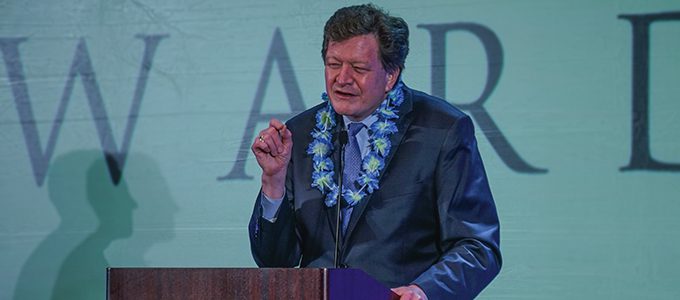
Kippen consolidated and centralized the hotel company's global learning function by launching Hilton Worldwide University.
by Kate Everson
November 12, 2015
Hilton Worldwide Holdings Inc. has had a turbulent decade.
“In 2007, the hotel company was taken over by private equity firm Blackstone Group for $26 billion. Two years later, its headquarters relocated to McLean, Virginia, from Beverly Hills, California, where it had been located since 1969. It went public in December 2013, and in May 2015, Blackstone Group sold 90 million shares of the company, reducing its ownership to less than 50 percent.
But in the middle of all of those shifts, Hilton recruited Kimo Kippen to fill its chief learning officer role. Chief Learning Officer awarded the company third place in its 2015 Learning Elite program — the highest ranking ever received by a first-time applicant.
Clearly, Kippen is doing something right.
The Hawaii native came from the competition — Marriott International, where he started in an HR generalist’s role in 2003 and grew through the ranks to become vice president at its Learning Center of Excellence from 2007 to 2009. After a brief break that included his ongoing professorship and executive-in-residence roles at the Catholic University of America, he joined Hilton in 2010.
Since becoming chief learning officer, Kippen consolidated and centralized the global learning function by launching Hilton Worldwide University. The five colleges within HWU train more than 325,000 employees at 4,350 properties and offices in 94 countries. With this global scope, it’s not surprising what his personal mission is.
“I aspire to be a citizen of the world,” Kippen said. “[I’m] humbled by learning from the world around me to support the development of people and the progress of our communities.”
One of the ways he is doing this is by teaming up with the Council for Adult and Experiential Learning to offer full-time, U.S.-based employees the chance to earn their GED. As long as they have six months of service and are in good standing with the company, Hilton will pay for coaching delivered by CAEL and the subsequent test. Kippen said his goal by the end of 2016 is to hear success stories from hundreds of employees who have succeeded in the program.
With an L&D budget that’s grown 20 percent every year, one of Kippen’s greatest tasks is elevating the value of learning and its alignment to Hilton’s business growth. Since he rejuvenated the company’s learning and development programs, the company has seen a rise in its guest scores, brand loyalty and global market foothold. After its IPO in 2013, the company saw a 27 percent increase in stock price.
Kippen’s work doesn’t stay sequestered in the organization — after all, as an aspiring citizen of the world, he can’t stay cooped up in McLean. As of June, Kippen’s CLO title included “global brand ambassador.” His role now requires him to serve on boards for professional societies and colleges, and speak to organizations about finding, retaining and developing talent.
“We hire for that engaging, outgoing personality that has a strong service orientation to best serve our customers, and then we train for skills,” he said. “First and foremost with Hilton, our mission is to spread the warmth and light of hospitality around the world, so does that resonate with you? If so, we’ll look to engage you and hire you.” And, ultimately, develop you.
For Kippen, learning goes both ways. Through feedback, he learns from the people he’s charged with developing so he can create programs that fit all learners’ styles, levels and ages. One of those lessons is the importance of specificity. Hilton is a global company with multiple brands and locales with myriad needs, but Kippen’s focus goes beyond what entire branches of employees require — he delivers what a specific department in a specific hotel needs.
All of this relates back to some advice Kippen has for his fellow CLOs. He said learning leaders should work for the people and do what is good for them. Make a difference in the world humbly and bring others — from entry-level learners to the C-suite — along to experience the journey.
“We as CLOs enable the business,” he said. “Alignment and executive sponsorship is a critical key to success.”



